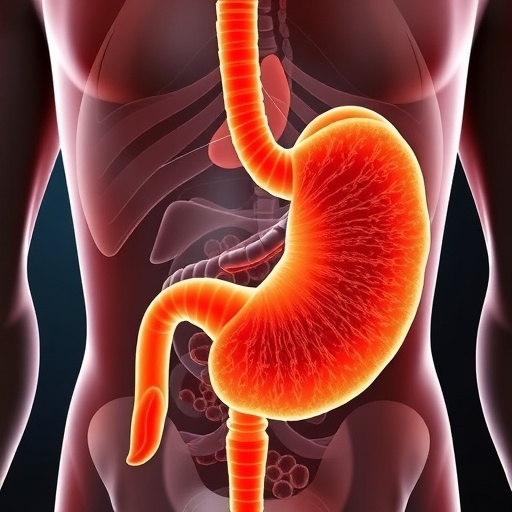In a groundbreaking study published in the Journal of Biomedicine and Science, a team of researchers led by Yang et al. has provided compelling evidence that probiotics can significantly counteract the adverse effects of Helicobacter pylori (H. pylori) in gastric cancer pathways. The relationship between this ubiquitous bacterium and gastric cancer has been established, but the mechanisms through which probiotics exert their protective effects remain largely unexplored. This study illuminates the biochemical pathways involved, particularly focusing on the regulation of miR-185, a microRNA implicated in cancer progression.
The research builds upon a wealth of previous studies linking H. pylori to increased levels of β-catenin and COX-2, both of which are crucial players in cell signaling pathways associated with tumor development. The significance of β-catenin in cancer biology cannot be overstated; it acts as a central component of the Wnt signaling pathway, which is crucial for cell proliferation, survival, and differentiation. Dysregulation of β-catenin often results in unchecked cellular growth, a hallmark of cancer. By nurturing an environment conducive to gut health, probiotics might mitigate the proliferation of these harmful cells.
In analyzing the effects of probiotics, the researchers designed an innovative experimental setup, incorporating multiple strains of probiotics to determine their efficacy against H. pylori-induced signaling alterations. The study utilized both in vitro and in vivo models, ensuring a comprehensive understanding of how probiotics interact with gastric tissues. Preliminary results indicated a marked improvement in gastric health among those subjected to probiotic treatment, suggesting a potential avenue for future therapeutic strategies.
The use of probiotics is frequently regarded as a non-invasive and holistic approach to health. As such, understanding their role in mitigating the effects of H. pylori could represent a seismic shift in how we approach gastric health. The researchers hypothesized that the mechanisms underlying the protective effects of probiotics might involve the modulation of miR-185 expression. This particular microRNA is known to play essential roles in various biological processes, including cancer development and immune response, suggesting that its targeting could lead to significant therapeutic advancements.
Initial assays showcased that probiotics indeed elevated the expression of miR-185 in gastric epithelial cells, subsequently reducing the aberrant activity of β-catenin and COX-2. The study presents invaluable data that elucidate the connection between microbiota balance and cancer signaling pathways. Probiotics may represent an adjunct therapy aimed primarily at ameliorating the gastric environment and offsetting the deleterious consequences of H. pylori infection.
Furthermore, the study delves into the cumulative effects of probiotics over extended periods, highlighting the necessity for sustained probiotic administration in achieving lasting changes in gastric microenvironments. In their experimental design, the authors examined various dosages and combinations of probiotic strains to assess their impact on the signaling pathways of interest. The results indicated a dose-response relationship, enhancing the validity of the findings and underscoring the potential for tailored probiotic therapies.
In the context of modern medicine, where antibiotic resistance is a growing concern, the implications of this research are profound. As healthcare professionals grapple with the limitations of conventional treatments for H. pylori, this new approach provides a beacon of hope. Probiotics could function as a complementary strategy, potentially reducing the need for prolonged antibiotic courses, which can lead to dysbiosis — an imbalance in the gut microbiota that itself poses significant health risks.
Nutritional scientists and gastroenterologists may find this research particularly provocative, as it reinforces the notion that gut health significantly influences broader physiological processes. The role of probiotics as modulators of the intestinal microbiome offers a fascinating glimpse into future therapeutic directions. By harnessing the power of nature, healthcare could pivot towards more sustainable treatment modalities.
Moreover, exploring the relationship between dietary habits and gut health is critical as populations increasingly adopt Westernized diets high in processed foods. Over time, such diets may alter the gut’s microbiome, exacerbating the prevalence of H. pylori-related illnesses. This underscores the necessity for dietary interventions that can work synergistically with probiotics, further amplifying their protective effects against gastric oncogenesis.
Moving forward, continued research is essential to clarify the specific strains of probiotics that yield the best results against H. pylori-induced carcinogenic pathways. As scientists pursue deeper insights into the complexity of the microbiome, the development of personalized probiotic therapies tailored to individual microbiota compositions could soon be on the horizon. Such advancements would mark a significant step in the ongoing battle against gastrointestinal diseases.
The findings from this study contribute to an expanding body of literature advocating for the integration of probiotics into healthcare regimens, especially for at-risk populations. As more studies replicate these results, there is a promising path for translating bench research into clinical practices, positively impacting countless lives while reshaping perceptions of probiotics from mere supplements to essential medical interventions.
In conclusion, Yang et al.’s research is a testament to the enduring potential of probiotics in modern medicine. Their ability to modulate pathways associated with gastric carcinogenesis heralds a new era where gut health is prioritized as an integral component of overall well-being. Future investigations will inevitably build on these findings, elaborating on the interplay between diet, microbiota, and cancer prevention in an era where personalized medicine is the ultimate goal.
Subject of Research: Probiotics and their impact on H. pylori-associated gastric cancer pathways.
Article Title: Probiotics ameliorate H. pylori-associated gastric β-catenin and COX-2 carcinogenesis signaling by regulating miR-185.
Article References:
Yang, YJ., Wu, CT., Cheng, HC. et al. Probiotics ameliorate H. pylori-associated gastric β-catenin and COX-2 carcinogenesis signaling by regulating miR-185.
J Biomed Sci 32, 55 (2025). https://doi.org/10.1186/s12929-025-01149-3
Image Credits: AI Generated
DOI: 10.1186/s12929-025-01149-3
Keywords: Probiotics, H. pylori, gastric cancer, β-catenin, COX-2, miR-185.




